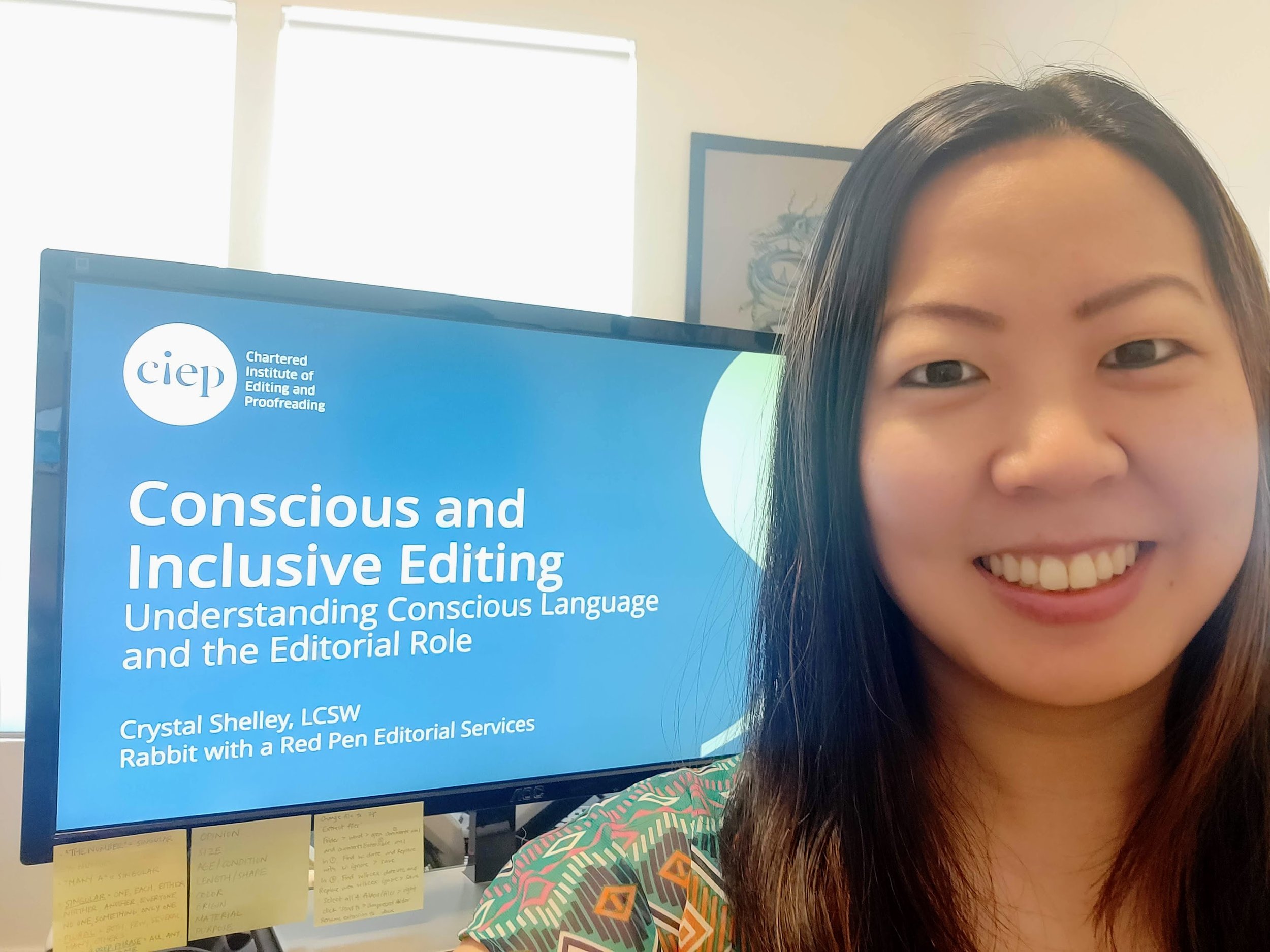What One Year of Public Speaking Has Taught Me
The thought of being in the spotlight and speaking in front of an audience used to fill me with dread—and honestly, it still does. So the fact that I’ve done twenty speaking events in the past year doesn’t sound real, and Past Me would wonder who the heck I was. Public speaking still terrifies me, but I’m passionate about the topics I talk about, and the desire to share what I know outweighs the fear. Through all of this, I’ve learned an incredible amount. These aren’t tips for how to speak in public but reasons why it’s been worth it for me to step outside my comfort zone.
I presented on conscious language and editing for the Chartered Institute of Editing and Proofreading (UK) on September 13, 2021. I’m always smiling after a presentation because that means it’s done and I don’t have to keep stressing about it!
Lesson #1: You’re the expert in the room.
Nothing makes imposter syndrome rear its ugly head like being asked to speak as an expert on a topic. I’ve had many moments of doubt when I’ve prepared for presentations: Why did they ask me? What do I actually know? What if I can’t answer a question? Everyone will discover I’m a fraud!
Those thoughts have quieted down the more I’ve spoken, but when they do pop up, I always tell myself that I’m the expert in the room (or on the screen). I’ve been invited to speak on a topic because I have insights worth hearing. Reminding myself of this makes me feel more confident, and I can go into these presentations knowing that I’m being asked to share my knowledge, not be infallible.
Lesson #2: You’ll never be perfect or know everything, but humility goes a long way.
I want to be perfect, and I want everyone to like me and what I have to say. Is any of that realistic? Of course not, but it’s who I am. If you’re anything like me, then putting yourself out there and speaking in front of people makes you feel incredibly vulnerable. You might make a mistake or hurt someone or say something that makes you look incompetent.
The thing is, you’re likely the only one expecting perfection from yourself. Most people are forgiving if you make a mistake or say that you don’t know something—if you’re humble about it. I’ve been challenged on some of the things I’ve said in presentations. It’s not easy to hear critiques, but the feedback has helped me learn new things, think critically about my views, and work harder.
Lesson #3: People are eager to learn and want you to succeed.
I’ve found that, for the most part, people are kind. They want to hear what you have to say, and unless they’re being forced to attend, they’re listening because they want to. People usually go into a presentation wanting you to succeed because it means they get more out of it. You might give them new things to think about or new ways of looking at things, or you’re reinforcing knowledge they already knew.
If a person disagrees with you, or you don’t resonate with them, then it’ll probably hurt to hear their feedback, but it might help you in the future.
Lesson #4: You’re pushed to learn and do better.
If I had to build a computer from scratch, I’d learn just enough to do the thing and be done with it, but nothing more. I wouldn’t absorb the knowledge (or if I did, it’d quickly get pushed out of my brain to make space for something else), learn the names of the parts, or be able to walk someone else through it. But if I had to speak in front of an audience about how to build a computer from scratch, you can bet that I’d do as much research as possible to make sure I knew what I was talking about.
Teaching about a topic forces you to learn everything you can because you want to make sure the information you’re sharing is comprehensive, up to date, and relevant. If I didn’t present on and speak about the subjects I did, I wouldn’t know nearly as much about them as I do.
Lesson #5: You never know what opportunities will come your way.
Speaking about topics that people are interested in and find useful in their work is a great way to establish yourself as a go-to resource on those topics. You never know who might watch your presentation or what it might lead to. A year ago, I never would’ve dreamed I’d be invited to chat on one of my favorite podcasts, present in front of an international audience of editors, or participate in a panel discussion for a major publisher, but those are just a few of the opportunities I’ve had because my previous presentations made an impression.
Final thoughts
I’m not going to tell anyone that they have to speak in public or that their fears or anxiety will suddenly disappear if they do. My hope is to gently nudge those of you who have ideas about topics you’ve wanted to present on but are scared to do so. Writers, editors, and publishers can learn so much from each other, and we’re all better off when we share.

